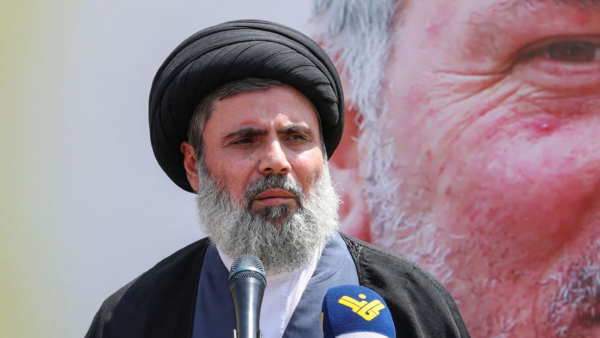Hashem Safieddine at the funeral of a senior Hezbollah field commander in Beirut in June. Pic: Reuters
Hassan Nasrallah’s cousin Hashem Safieddine is among the frontrunners to replace the assassinated Hezbollah leader.
Following the death of Hezbollah’s leader Hassan Nasrallah, speculation has already begun about who will replace him.
Nasrallah, 64, had been at the helm of the militant Lebanese group for 32 years. His cousin Hashem Safieddine is among the frontrunners to take over.
Nasrallah’s younger cousin was born in the southern Lebanese village of Deir Qanoun En Nahr near Tyre in 1964.
The young men studied theology together at two Shia institutions – one in Najaf, Iraq, and the other in Qom, Iran.
They are seen from their supporters to be from a well-respected Shiite family that has produced both religious scholars and Lebanese politicians.
Safieddine’s brother is Hezbollah’s representative to Iran, while his son is married to the daughter of Qassem Soleimani – the Iranian general killed in a US drone strike during Donald Trump’s presidency in 2020.
Like his cousin, Safieddine joined Hezbollah soon after it was set up in the early 1980s.
He also wears a black turban, as Nasrallah did, denoting being a direct descendant of the Prophet Muhammad.
Safieddine’s family ties and his close resemblance to his late cousin will likely help his leadership bid, experts say.
He is already the head of Hezbollah’s Jihad council and among the top members of its Shura council.
Known for his militant views, he is in charge of the group’s political affairs.
At a recent event in Dahieh, where this week’s airstrikes took place, he said in support of Hamas in Gaza: “Our history, our guns and our rockets are with you.”
And at a funeral of one of his fellow commanders in June he appeared to threaten further escalation of the conflict with Israel, declaring: “Let [the enemy] prepare himself to cry and wail.”
He has always been a vocal critic of US policy, declaring that year: “This mentally impeded, crazy US administration headed by Trump will not be able to harm the resistance.”
Career
In 1995, he was promoted to the Majlis al-Shura (Consultative Assembly), the highest council in Hezbollah, after which he operated under Imad Mughniyeh, until the latter’s assassination in 2008. He was also appointed head of the Jihad Council. The Executive Council, of which he is president, oversees Hezbollah’s political, social, and educational activities.
Until Nasrallah’s assassination on 27 September 2024, he was among the three major leaders of Hezbollah. The other two were Hassan Nasrallah and Naim Qassem He was regarded as second only to Nasrallah.
In 2006, he was reportedly promoted by Iran as a possible successor to Hassan Nasrallah for the post of Secretary-General of Hezbollah.
He is one of six clerics who are members of the shura council of Hezbollah. He is the head of the executive council of the group, also known as Shura Tanfiziyah, to which he was elected in the general assembly meeting in July 2001. He is one of nine members of the deciding consultative council (Shura al-Qarar), which is the top body of the group.
In October 2008, he was elected to succeed Nasrallah as secretary general of Hezbollah in the general meeting. His appointment as heir apparent to Nasrallah was supported by the Iranians. In 2009, he was again elected to the Shura Council. In November 2010, he was appointed as Hezbollah’s military commander of the Southern Lebanon region.
In 2017, he was designated a terrorist by the U.S. Department of State and Saudi Arabia. In 2018, he was subject to sanctions imposed by the US and some Arab countries, including Saudi Arabia, the United Arab Emirates and Bahrain, in addition to nine other senior Hezbollah figures.
After the assassination of Hezbollah leader Hassan Nasrallah, he has been called the most likely candidate for the position. He is recognized for his similarity to Nasrallah in both appearance and manner of speaking, notably including a shared speech impediment, and has strong ties with Iran and the Ayatollah regime


Leave a Reply
You must be logged in to post a comment.